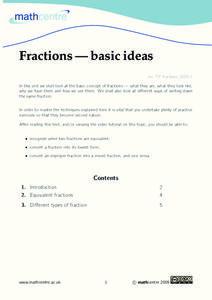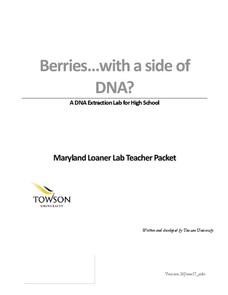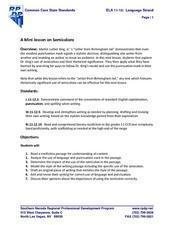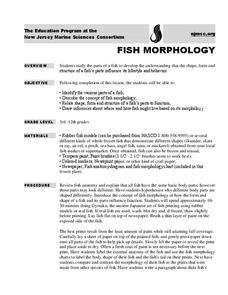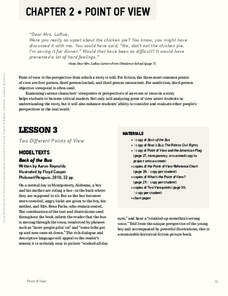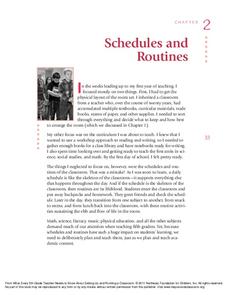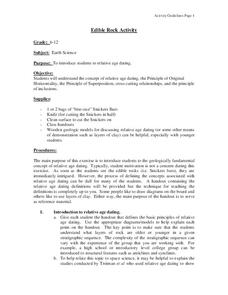West Contra Costa Unified School District
Polynomial Division
Multiply the ways your scholars can find the quotient with polynomial division. A lesson introduces polynomial division via long division, synthetic division, generic area model, and using the definition of division. Learners then...
Walters Art Museum
The Symbolism of Allegorical Art
Introduce learners to allegorical art with four bronze sculptures by Francesco Bertos. After modeling how to recognize bias and allegory in Bertos' Africa, class groups examine the other three sculptures in the series before creating...
Civil War Trust
Civil War Personalities Lesson Plan
Caring, trustworthiness, and responsibility—these are only a few character traits in focus of a lesson based on stories from the Civil War era. Class members explore several influential lives while reading biographies that highlight...
National Math + Science Initative
Introduction to Decimals
Three activities make up an introductory lesson designed to create a strong foundation in comparing fractions to decimals and exploring and building decimal models. Pupils brainstorm and complete a Venn diagram to show how decimals and...
Kentucky School for the Deaf
Levels of Organization within an Ecosystem
From tiny organisms to entire biomes, young scientists examine the interdependent relationships tying all living and non-living things together with this collection of ecology resources.
Math Centre UK
Fractions—Basic Ideas
What are fractions? Find out using a reference page and video that goes in depth on how to make fractions equivalent, write fractions in simplest form, convert improper fractions into mixed numbers, and vice versa. Following...
Towson University
The Wildlife Forensics Lab
Can science put an end to the poaching of endangered species? Show your young forensic experts how biotechnology can help save wildlife through an exciting electrophoresis lab. Grouped pupils analyze shark DNA to determine if it came...
Towson University
Berries...With a Side of DNA? (High School)
Is DNA still present after picking fruit or cooking vegetables? Biology scholars extract and collect DNA strands in an impactful lab. Working groups prepare their samples and compare their results to negative and positive standard...
Southern Nevada Regional Professional Development Program
A Mini lesson on Semicolons
Dr. Martin Luther King, Jr.'s "Letter from Birmingham Jail" serves as an exemplar for a mini-lesson on semicolons. Working alone or in small groups, class members first circle all the semicolons in the letter, and then consider how this...
Maryland Department of Education
The Concept of Diversity in World Literature Lesson 8: Nonfiction Close Reading
As part of their study of Things Fall Apart, class members conduct a close reading of a section of Chinua Achebe's essay, "An Image of Africa: Racism in Conrad's Heart of Darkness." Jigsaw groups then compare the voice in the essay...
Classroom Law Project
What should I watch for in the debates?
Prepare your classes for election year debates with a series of activities that model how to watch televised debates and how to evaluate the moderators as well as the debaters.
San José State University
Transition Words
Translate transition words for your class with this handout and brief exercise. Fairly straightforward and informative, it includes sample sentences and a working link to a more complete list of transition words. There are two different...
TryEngineering
Choose Your Best Way
Find the best path through town. The lesson teaches future computer programmers about networks and paths in graph theory. They develop a network of their towns to determine the most efficient path to visit each of their homes.
Maryland Department of Education
The Concept of Diversity in World Literature Lesson 5: The Tragic Hero
Should identifying a tragic hero be based on a universal definition or a definition based on the morals and values of a specific culture? As part of a study of Things Fall Apart, class members read Sylvia Plath's "Colossus" and then...
Houghton Mifflin Harcourt
Around Town: Neighborhood and Community: Extra Support Lessons (Theme 3)
Neighborhood and community is the theme of a unit comprised of extra support lessons. Following practice pages and a teach, blend, guided practice, practice/apply routine, the series of lessons provide additional reinforcement...
Consortium for Ocean Science Exploration and Engagement (COSEE)
Fish Morphology
Life comes in all different shapes and sizes, and fish are no exception. Here, young scientists create fish prints as they learn how specific characteristics allow different species to survive in their particular habitats.
Scholastic
Point of View
The point of view in a story can dramatically change the story itself. Focus on finding the points of view in various reading passages with a language arts packet, which includes fiction and nonfiction text.
Maryland Department of Education
The Concept of Identity Lesson 8: Propaganda in Visual Media
Visual and print propaganda are featured in a instructional activity that asks readers of A Separate Peace to examine the techniques used in propaganda from World War I, World War II, presidential elections, and in the novel.
Northeast Foundation for Children, Inc.
Schedules and Routines: Grade 5
Before diving head first into the year's curriculum, take time to establish clear routines and procedures for your classroom. Starting with how to set up a class schedule that meets the needs of fifth grade learners, this sample...
Achieve3000
Figurative Language
Similes and metaphors make writing more beautiful and detailed, but can be a little harder to decipher during a first reading. Use a passage from The Man Who Loved Words to show young readers how to think through passages that...
Virginia Department of Education
Nonlinear Systems of Equations
Explore nonlinear systems through graphs and algebra. High schoolers begin by examining the different types of quadratic functions and their possible intersections. They then use algebraic methods to solve systems containing various...
Urban Education Exchange
Lessons and Units: The Watsons go to Birmingham—1963 5TH GRADE UNIT
Get ready to read The Watsons Go to Birmingham - 1963 with a lesson about historical fiction. Spanning several centuries, the resource prompts learners to guess the historical era of a story based on a word or phrase...
Curated OER
Edible Rock Activity
Who knew Snickers® could be used to teach science? Give your budding earth scientists a chance to explore the Law of Superposition, in addition to a well-earned snack.
Brown University
Brown University: Group Work
How can one design and facilitate group work that helps students learn? This collection of resources explain that process.





